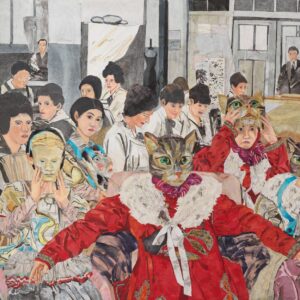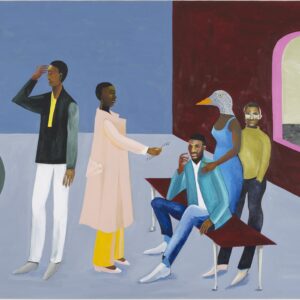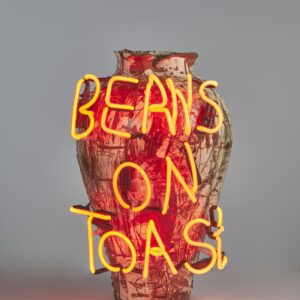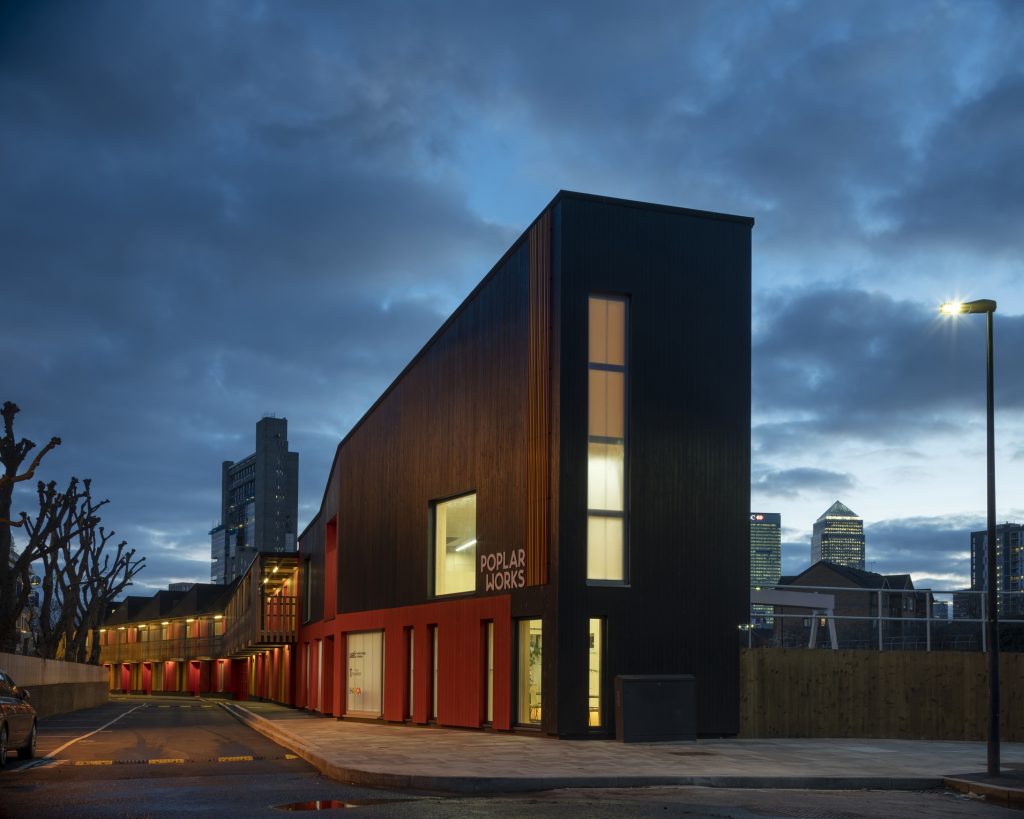
An innovative new home for East London’s fashion economy has been launched. Designed by award-winning architects Adams & Sutherland, Poplar Works is the £6m transformation of 100 disused garages in the Aberfeldy and Teviot neighbourhoods, into 45 custom-designed, low-cost workshops and studios, a public café and events space, and manufacturing facilities offering enterprise support and training programmes for the creative industries.
The project was designed to nurture the exis(ng talent and entrepreneurship in the area, by providing affordable workspace and training opportunities, as well as creating a new community facility. Located in the heart of the Fashion District, it has been delivered by housing association Poplar HARCA, in partnership with London College of Fashion, UAL and social enterprise The Trampery. The scheme is supported by funding from the Mayor of London’s Good Growth Fund – a landmark regeneration initiative that champions growth and community development in the capital, with support from the London Economic AcNon Partnership. Fashion has a special place in East London’s story, once making a significant financial and cultural contribution to the area. Poplar Works, was conceived around the simple idea that fashion could again become a major part of East London’s social and economic make-up.
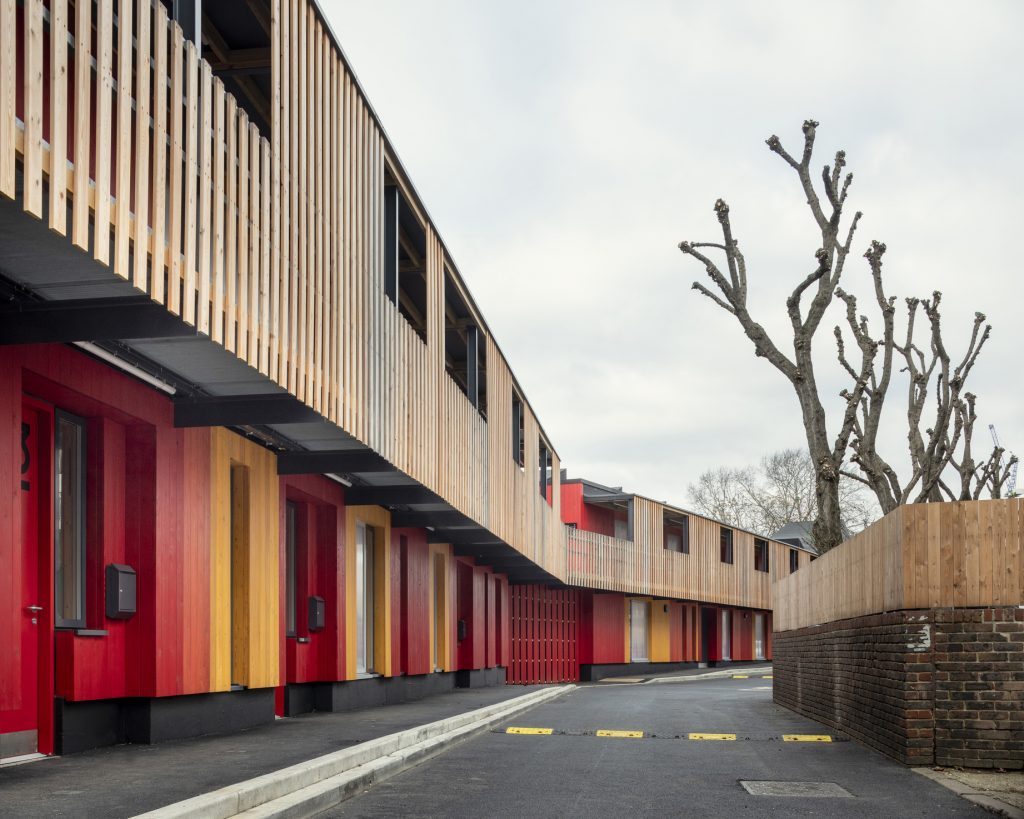
The active colourful street frontage has helped reduce anti social behaviour on Abbott Road a residential street
Professor Roni Brown – Head of London College of Fashion and Pro-Vice Chancellor, University
of the Arts London:
“The opening of Poplar Works is a key milestone in our journey to East London, ahead of the college’s move to the Queen Elizabeth Olympic Park. The site represents our commitment to our graduates’ futures and to the local community. Poplar Works is a key achievement of the Fashion District, a multi-sector partnership, led by London College of Fashion, UAL with the ambition to grow a more inclusive and sustainable fashion sector in East London, which is why we are so pleased to announce seven new businesses, including alumna Bethany Williams, who share core values which challenge fashion norms, address sustainability, and empower men and women through great design.”
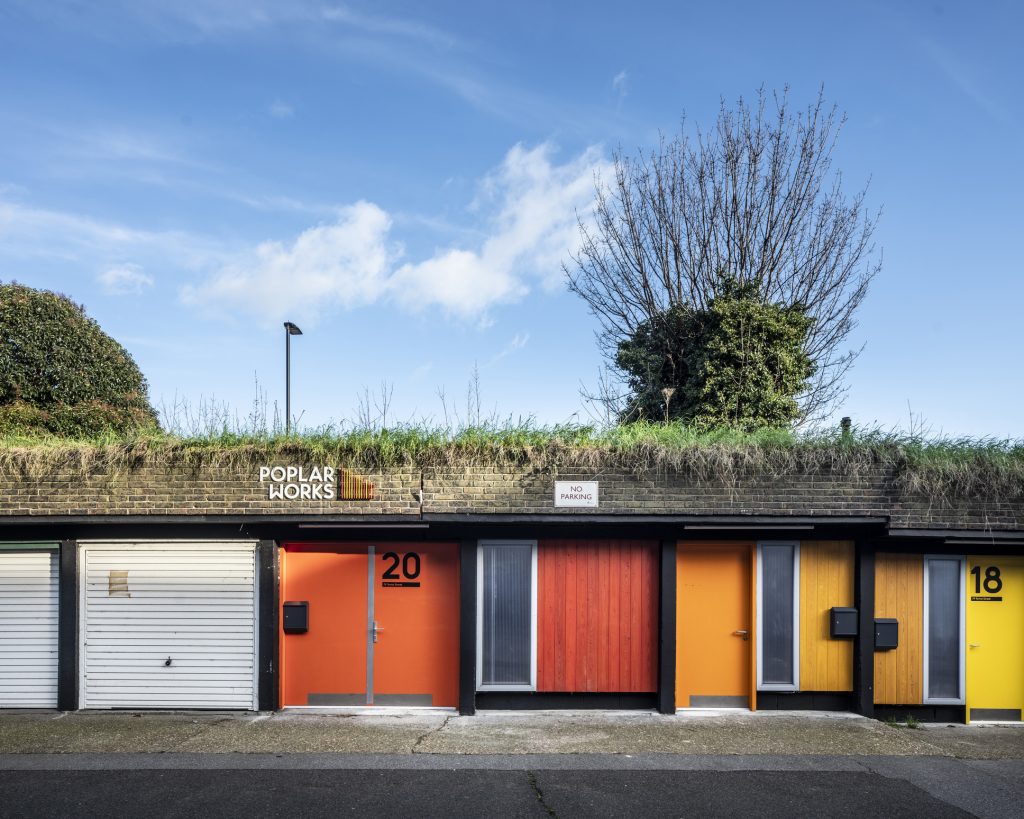
Unused garages in Teviot Street have been transformed into secure low cost workspaces
Poplar Works’ studios will be shared by The Trampery, the London-based specialist in creative coworking, workspaces, and training for entrepreneurs and creative businesses, and London College of Fashion, UAL, as the first step in the college’s move to The Queen Elizabeth Olympic Park in 2022.
The Trampery will operate 40 of the studios, in close integration with its new campus at Fish Island Village, two miles up the River Lea. Ranging in size from 100 to 300 square feet, The Trampery Poplar Works, for which applications are now open, will offer an ultra-affordable starting point for emerging fashion-related businesses. Fish Island Village will then provide a range of expansion options for businesses requiring more space.
As well as studios, The Trampery will deliver workshops from its Sustainable Fashion Accelerator programme. This six-month intensive course, which is generously supported by London Legacy Development Corporation, is designed to help emerging fashion labels rework their strategy to reduce environmental impact and improve working standards. Participants to date include Patrick McDowell, Daniel W Fletcher, Steven Tai, Petit Pli, Roker Atelier and Martina Spetlova. London College of Fashion, UAL will make a new home for their award-winning Making for Change programme, helping people gain hands-on fashion manufacturing skills and industry- recognised qualifications, as well as their Centre for Fashion Enterprise (CFE). Part of London College of Fashion’s Graduate Futures offering, the Centre for Fashion Enterprise is renowned for the workshops and expert advice it provides. To date, 750 fashion businesses have benefitted from CFE’s support, including designers that have gone on to become household names and whose businesses contribute hugely to the UK’s Creative Industries economy. CFE alumni include Molly Goddard, Charles Jeffrey, Craig Green, Wales Bonner, Mary Katrantzou and Erdem.
In response to the current financial and political climate, and wider shifts within the fashion industry, CFE is building on its experience and authority to develop a new model that will support innovative businesses that have the potential to disrupt and sustain the fashion industry. As part of this model, CFE will now provide five free studios for emerging fashion and fashion tech businesses at Poplar Works. The inaugural cohort selected to move in will be LCF alumna Bethany Williams – honoured with the award for ‘British Menswear Talent – Emerging’ at the recent Fashion Awards, Rahemur Rahman, Loot Forever, Alex Mullins, Tolu Coker, Juliet Harrera and Not Very Well. All have at their core a need to challenge fashion norms, address sustainability, and empower men and women through great design. With its new base at Poplar Works, CFE will continue to build on the impact it has in the industry.
Poplar Works is a significant part of the Lower Lea Valley’s regeneration story, with thousands of new homes being built in the area over the next decade. For Poplar HARCA, which is leading the regeneration of the Aberfeldy and Teviot estates, Poplar Works represents how an area undergoing significant change can be supported, through industry-focused partnerships that create access to skilled jobs, training and enterprise opportunities for local communities. Significantly, over half the applications for space to date have come from residents and businesses from the borough of Tower Hamlets, and some of the first tenants include Poplar- based womenswear designer OMNISS and interior and lifestyle brand Yod and Co.
A new home for London’s fashion economy and a cornerstone of the resurgent creative and industrial identity of East London, Poplar Works is a key achievement of the Fashion District, a multi-sector partnership with the ambition to grow a more inclusive and sustainable sector, which positions London as a global capital of fashion technology. Building on the Mayor’s investment in East London as a centre for the creative industries, it will act as a feeder to grow- on spaces in nearby future developments, reinforcing and underscoring the success and impact of the East Bank, now and for years to come.
